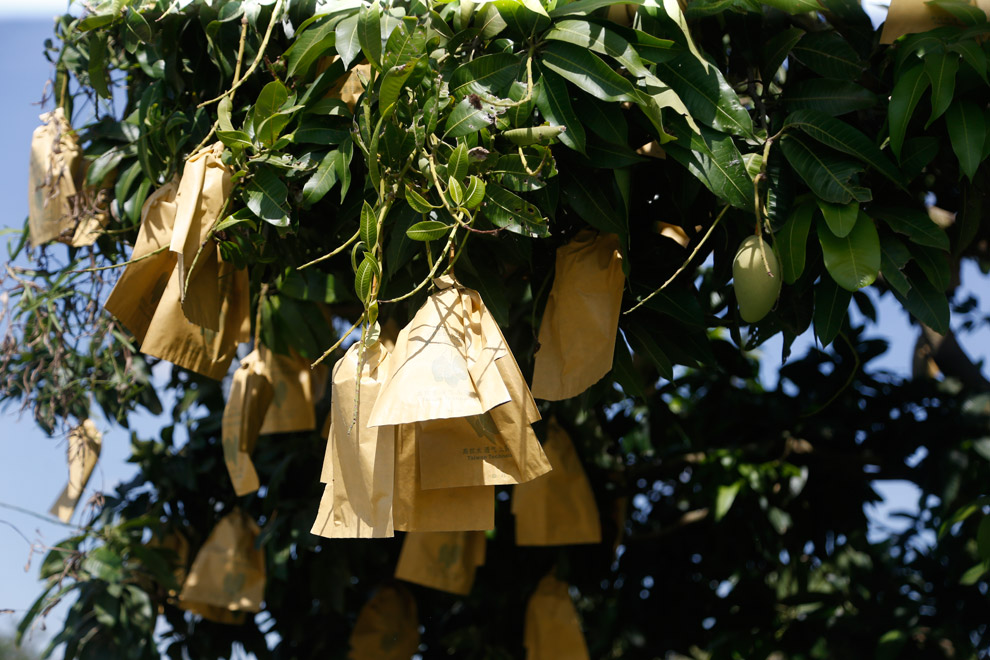
A mango farm at Kandal's Lvea Em district. Heng Chivoan
The General Directorate of Agriculture said it had submitted a list of 25 mango farms and three treatment facilities to the Chinese General Administration of Customs for sanitary and phytosanitary inspections.
This comes after the farms and treatment facilities passed an initial check from inspectors from the directorate and as the government prepares for the first commercial shipment of fresh Cambodian mangoes of the ubiquitous Keo Romiet variety following three trial shipments to China via Vietnam at the start of December.
This was the second such list after the first on February 12, and brings the total to 30 farms and four treatment facilities, said the directorate, adding that approval would result in the Chinese side granting export permits for fresh mango.
Meanwhile, as mango prices plummeted at the beginning of this year’s harvest, the Ministry of Agriculture, Forestry and Fisheries on February 23 reiterated its call for growers of the fruit to register their plantations as orchards for exports.
“In order to maintain stability in the price and market, the agriculture ministry will continue to invite, day in day out, all mango growers to register” at the directorate, the ministry said in a statement.
Registration will include technical training for farmers to boost productivity and the quality of their produce in a manner consistent with internationally-recognised standards, as well as incorporation into business clusters to connect with local and international companies and clinch contract farming agreements linked to processing for export, the ministry added.
Um Saroeun, president of the Kirirom Keo Romiet Mango Agricultural Community whose members grow on more than 2,000ha in Kampong Speu province, told The Post that seven of his community’s 45 members had applied to register their farms at the directorate.
Two of them had secured spots on the directorate’s lists, he said, voicing confidence that more members would apply.
“With certifications [issued by the directorate after passing preliminary inspections] in hand, we hope a company will buy mangoes from us to export to the Chinese market,” Saroeun said.
The ministry noted that simultaneous mango harvest seasons in Cambodia and elsewhere had saturated the market, outpaced demand and eroded prices since the beginning of this month, even as the Covid-19 pandemic maintains its economic stranglehold on the world.
The retail price of fresh mangoes in China today has dropped to between $1.10 and $1.20 per kilogramme, the ministry said, citing data from www.globalprice.info.
Saroeun, however, said the wholesale price of mango had capsized to just 200 riel ($0.05) per kilogramme in his area. “This price cannot be offset, given the cost of harvesting and transport.
“That being the case, mango can only secure a strong market with the presence of processing plants, which we recognise that the ministry is jumping through hoops to set up in our country,” he said.
In its mission to stage a rebound in mango prices on the market and increase incomes for producers, the ministry says it is in talks with countries such as South Korea, China and Japan on technical, hygiene and phytosanitary regulations to secure additional markets for Cambodian mango products.
Last month, the Kingdom reached an agreement with South Korea on phytosanitary requirements for commercial mango shipments to the East Asian economy.
The ministry in June signed the protocol on Phytosanitary requirements for the export of fresh Keo Romiet mangoes from Cambodia to the People’s Republic of China.
This allowed the Kingdom to the export 500,000 tonnes of fresh Keo Romiet mangoes per year to China.
A mid-December report from the directorate found that Cambodia has 124,319ha of mango plantations, of which 91,398ha are harvested with an average yield of 1,448,677 tonnes per season. This translates to an average of 15.85 tonnes per hectare per each of the year’s two seasons.












